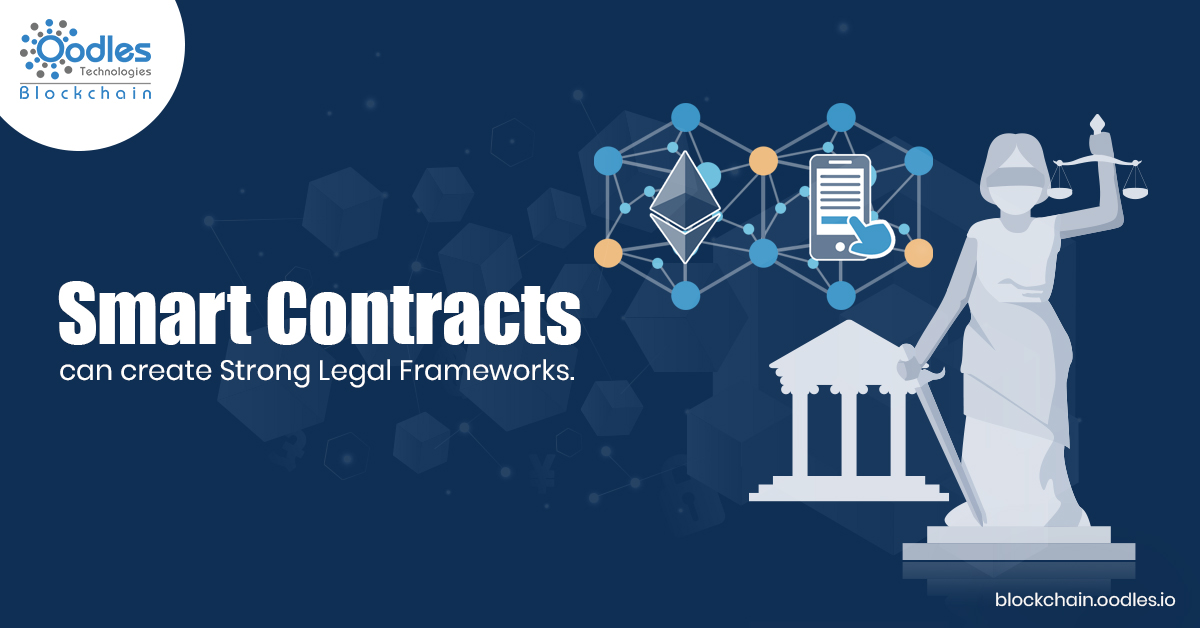-
In plain words, Contracts that are smart enough are Smart Contracts. It is similar to phones that are smart enough being known as Smartphones. ‘Smart’ here, means an automated and independent process capable of making its own decision to accomplish a task it is meant to do when exposed to external conditions. Smart Contracts is the functioning mechanism of Distributed Ledger Technology(DLT), which is the underlying science behind Blockchain. It is understood as a system that keeps the record of transactions of digital assets. In such a system, the information and transactions are recorded at the same time in multiple places, called Ledgers. Chain of such ledgers is called a Blockchain or Smart Contracts Blockchains.
Technicalities of Smart Contracts Blockchains
Blockchain comprises of distributed blocks. A Blockchain network increases its size adding new blocks or ledgers to the existing chain. Such ledgers contain a cryptographically encoded code, which defines the set of rules for that particular system or the Smart Contracts Blockchain. This set of encoded rules are replicated in each block. The authenticity of these codes, if they changed or got corrupt at a point of time, is verified by the network of computers connected to the chain. This set of codes is called the Smart Contract. Here, Contract implies to the set of guidelines that a new block should follow to be a part of the network. There set of rules is comparable to legal contracts or agreements between two parties in the physical world. Being translated to the digital world, they transform as Smart Contracts.
Smart Contracts & Techno-Legality
The ingrained nature of Smart Contracts made it an alternative to the physical legal system. The pertinent argument of “Can Computer Codes replace Law” is a burning topic in technology. Apparently, this technology has the prowess to replace lawyers and countermand the need for conventional legal systems with digital interference. The advocates of Smart Contracts Blockchains comprise of legal experts and technologists. It is emerging with a serious approach, overhauling the conventional system. A recent example is the new ICO startup Matteruem, a London based company providing a way to gain legal title over any physical object, asset or property.
Accord Project
Smart Contract came up a significant way ahead of being only associated with cryptocurrency. It is transforming as an established framework digitizing the legal process of the physical world. In this metamorphosis, the technology is being through a process of evolution, with impacts from several legal verticals. Such a vertical is Accord Protocol. This is the set of protocols for smart legal contracting. These protocols are being developed by the Accord Project. This organization recently partnered with IEEE techno-legal contracts for Smart Contract Applications.
Accord Project is an open source technology, developing the standards for Computational Contracting. It is backed by leading technology giants like Hyperledger, legal firms and global organization like International Association for Commercial and Contract Management(IACCM). Accord Project is creating an array of cross-industry blockchain based technologies and smart contracts blockchains.
Legal Contracts are now in PDF and paper format, Accord Project extracts the information from such documents creating Smart Contracts. These Smart Contracts are self-managing in the sense that they can update its response as per the input of conditions. Initiatives such as the Accord Project is aggressive in creating a new vertical of Techno-legality.
Matteruem
Another emerging ICO is Mattereum, as mentioned before. Mattereum claims to as the technology that will bridge the gap between digital Smart Contracts and physical legal contracts. The white paper described it as a “commercial infrastructure to turn smart contracts into legal contracts”. Interestingly, the team has Ian Grigg, the inventor of Ricardian Contract. While Smart Contracts is an automated process to work on an agreed contract, Ricardian Contract captures the intent of agreements between the parties.
ICO like Mattereum is taking the techno-legal industry to new heights. Smart Contract being the underlying technology, is building up concepts like Artificial Lawyers, Automated Legal Systems and other such cutting-edge innovations. This technology forayed into the vertical dominated by the human with both its advantages and lackings. Although technology cannot have a sense of justice, Smart Contracts created a stringent and incorruptible legal framework.

Our Offices
INDIA
Emaar Digital Greens, Sector 61,
Gurugram, Haryana
122011.
Welldone Tech Park,
Sector 48, Sohna road,
Gurugram, Haryana
122018.














